Mythos and Logos: Exploring Ancient Greek Philosophical Concepts
VerifiedAdded on 2023/06/03
|5
|949
|267
Homework Assignment
AI Summary
This paper examines the philosophical concepts of Mythos and Logos, tracing their origins in ancient Greece and their evolution. It discusses the shift from mythological explanations to rational thought, highlighting the contributions of Pre-Socratic philosophers, Socrates, Plato, and Aristotle. The paper analyzes how these thinkers bridged the gap between Mythos and Logos, and explores the influence of Plato and Aristotle on modern culture, including their impact on religious beliefs, skepticism towards science, and the role of art and politics. The author concludes that the treatment of Mythos and Logos by ancient Greek philosophers laid the foundation for modern philosophical and scientific inquiry.
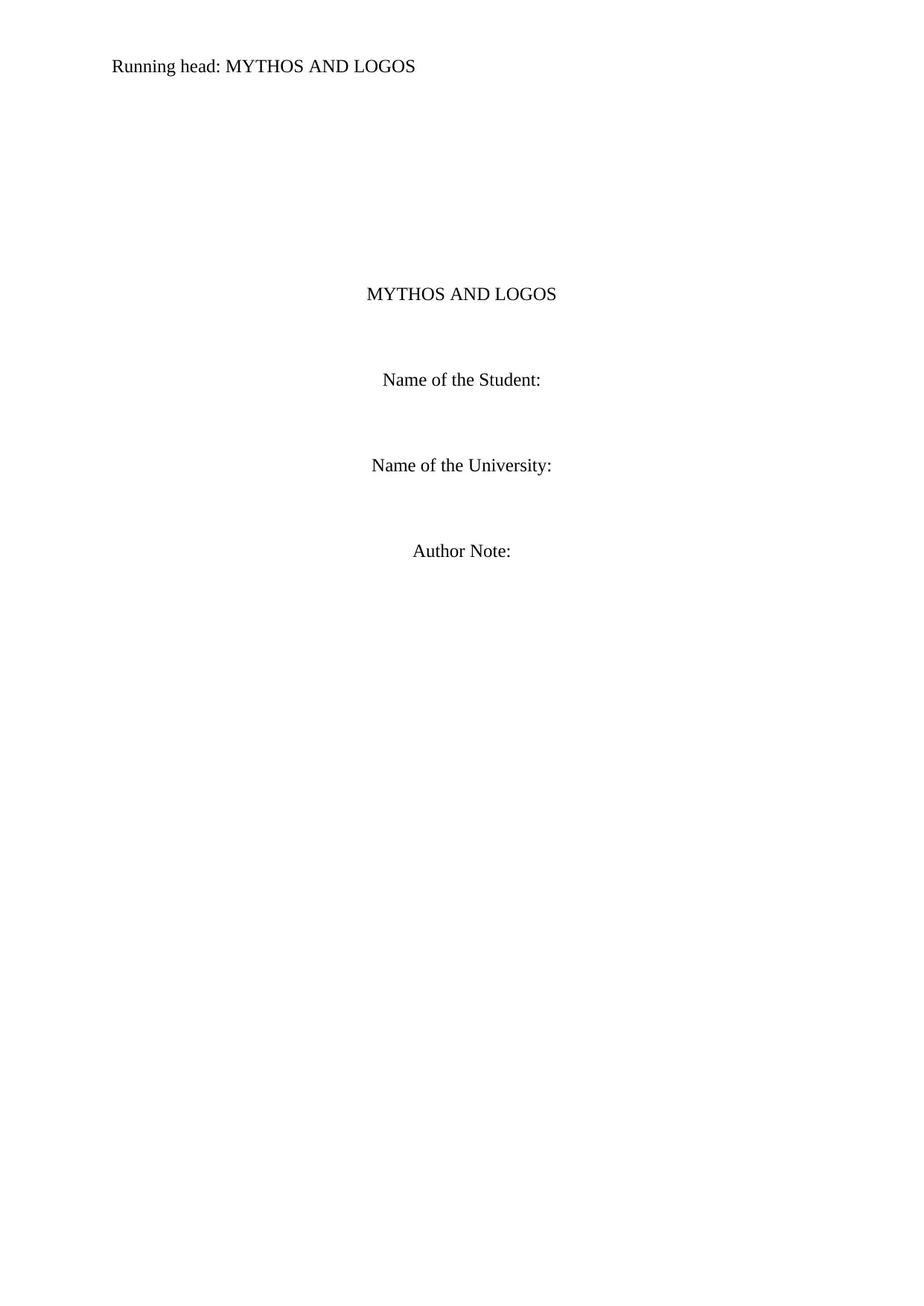
Running head: MYTHOS AND LOGOS
MYTHOS AND LOGOS
Name of the Student:
Name of the University:
Author Note:
MYTHOS AND LOGOS
Name of the Student:
Name of the University:
Author Note:
Paraphrase This Document
Need a fresh take? Get an instant paraphrase of this document with our AI Paraphraser
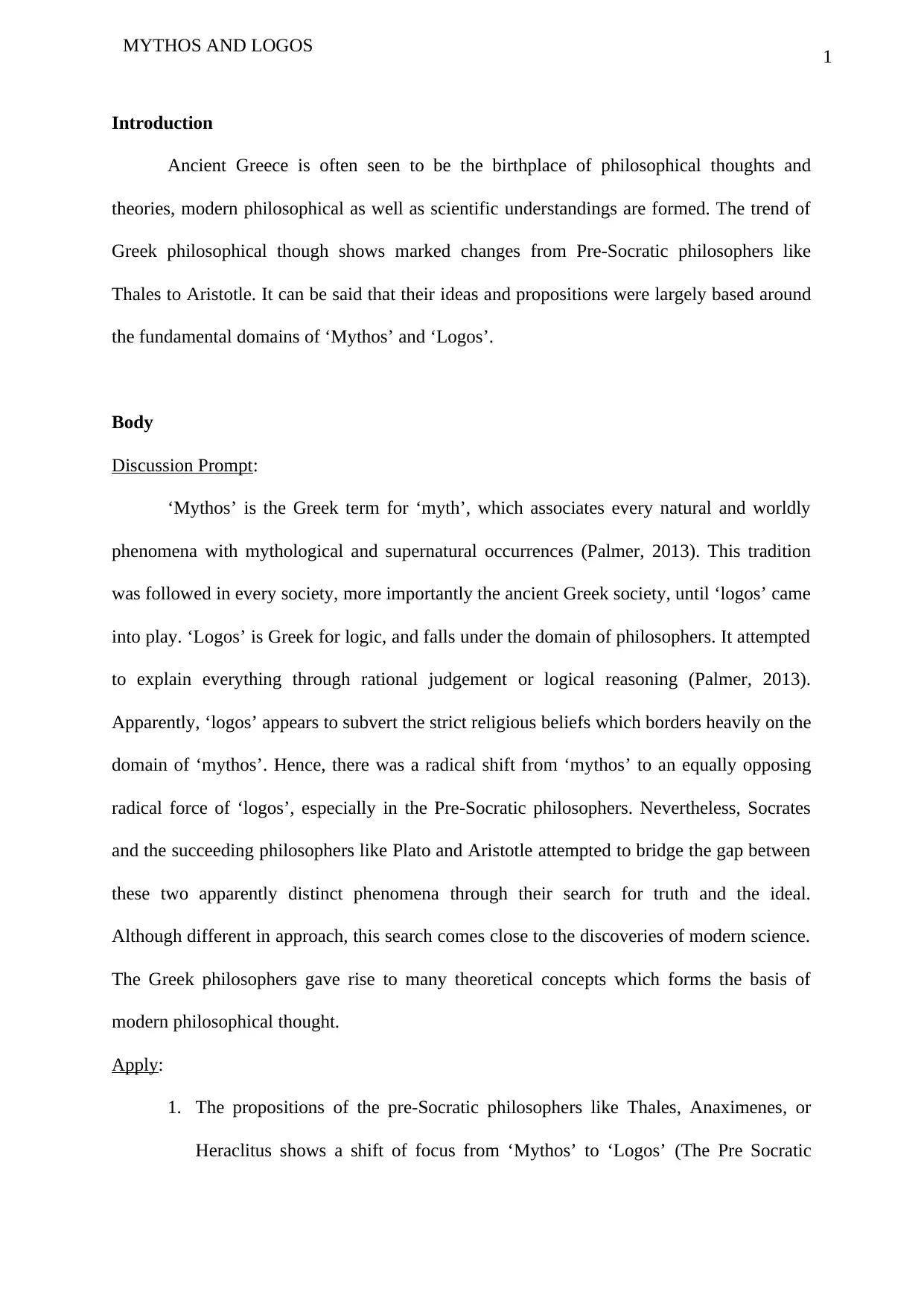
1
MYTHOS AND LOGOS
Introduction
Ancient Greece is often seen to be the birthplace of philosophical thoughts and
theories, modern philosophical as well as scientific understandings are formed. The trend of
Greek philosophical though shows marked changes from Pre-Socratic philosophers like
Thales to Aristotle. It can be said that their ideas and propositions were largely based around
the fundamental domains of ‘Mythos’ and ‘Logos’.
Body
Discussion Prompt:
‘Mythos’ is the Greek term for ‘myth’, which associates every natural and worldly
phenomena with mythological and supernatural occurrences (Palmer, 2013). This tradition
was followed in every society, more importantly the ancient Greek society, until ‘logos’ came
into play. ‘Logos’ is Greek for logic, and falls under the domain of philosophers. It attempted
to explain everything through rational judgement or logical reasoning (Palmer, 2013).
Apparently, ‘logos’ appears to subvert the strict religious beliefs which borders heavily on the
domain of ‘mythos’. Hence, there was a radical shift from ‘mythos’ to an equally opposing
radical force of ‘logos’, especially in the Pre-Socratic philosophers. Nevertheless, Socrates
and the succeeding philosophers like Plato and Aristotle attempted to bridge the gap between
these two apparently distinct phenomena through their search for truth and the ideal.
Although different in approach, this search comes close to the discoveries of modern science.
The Greek philosophers gave rise to many theoretical concepts which forms the basis of
modern philosophical thought.
Apply:
1. The propositions of the pre-Socratic philosophers like Thales, Anaximenes, or
Heraclitus shows a shift of focus from ‘Mythos’ to ‘Logos’ (The Pre Socratic
MYTHOS AND LOGOS
Introduction
Ancient Greece is often seen to be the birthplace of philosophical thoughts and
theories, modern philosophical as well as scientific understandings are formed. The trend of
Greek philosophical though shows marked changes from Pre-Socratic philosophers like
Thales to Aristotle. It can be said that their ideas and propositions were largely based around
the fundamental domains of ‘Mythos’ and ‘Logos’.
Body
Discussion Prompt:
‘Mythos’ is the Greek term for ‘myth’, which associates every natural and worldly
phenomena with mythological and supernatural occurrences (Palmer, 2013). This tradition
was followed in every society, more importantly the ancient Greek society, until ‘logos’ came
into play. ‘Logos’ is Greek for logic, and falls under the domain of philosophers. It attempted
to explain everything through rational judgement or logical reasoning (Palmer, 2013).
Apparently, ‘logos’ appears to subvert the strict religious beliefs which borders heavily on the
domain of ‘mythos’. Hence, there was a radical shift from ‘mythos’ to an equally opposing
radical force of ‘logos’, especially in the Pre-Socratic philosophers. Nevertheless, Socrates
and the succeeding philosophers like Plato and Aristotle attempted to bridge the gap between
these two apparently distinct phenomena through their search for truth and the ideal.
Although different in approach, this search comes close to the discoveries of modern science.
The Greek philosophers gave rise to many theoretical concepts which forms the basis of
modern philosophical thought.
Apply:
1. The propositions of the pre-Socratic philosophers like Thales, Anaximenes, or
Heraclitus shows a shift of focus from ‘Mythos’ to ‘Logos’ (The Pre Socratic
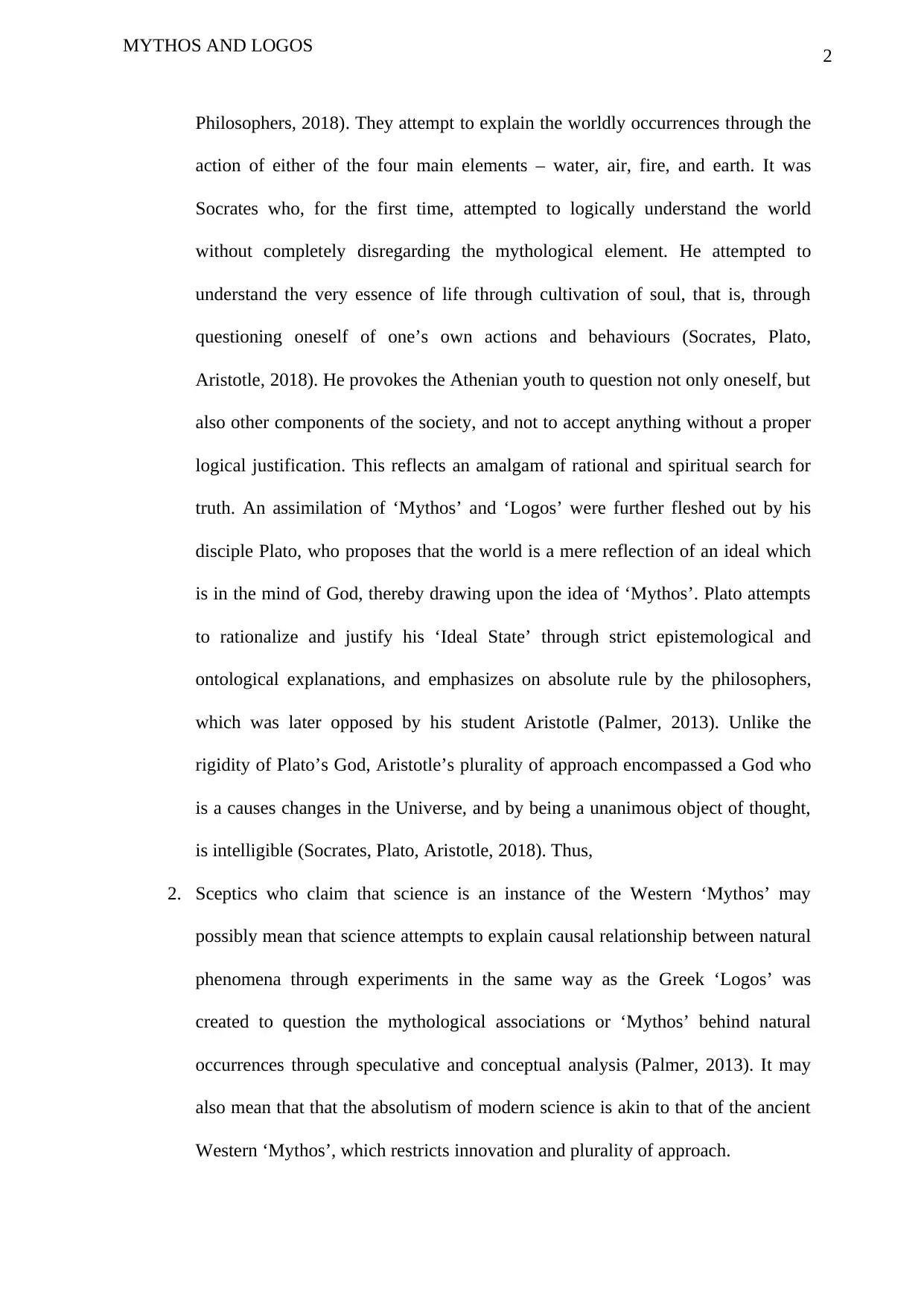
2
MYTHOS AND LOGOS
Philosophers, 2018). They attempt to explain the worldly occurrences through the
action of either of the four main elements – water, air, fire, and earth. It was
Socrates who, for the first time, attempted to logically understand the world
without completely disregarding the mythological element. He attempted to
understand the very essence of life through cultivation of soul, that is, through
questioning oneself of one’s own actions and behaviours (Socrates, Plato,
Aristotle, 2018). He provokes the Athenian youth to question not only oneself, but
also other components of the society, and not to accept anything without a proper
logical justification. This reflects an amalgam of rational and spiritual search for
truth. An assimilation of ‘Mythos’ and ‘Logos’ were further fleshed out by his
disciple Plato, who proposes that the world is a mere reflection of an ideal which
is in the mind of God, thereby drawing upon the idea of ‘Mythos’. Plato attempts
to rationalize and justify his ‘Ideal State’ through strict epistemological and
ontological explanations, and emphasizes on absolute rule by the philosophers,
which was later opposed by his student Aristotle (Palmer, 2013). Unlike the
rigidity of Plato’s God, Aristotle’s plurality of approach encompassed a God who
is a causes changes in the Universe, and by being a unanimous object of thought,
is intelligible (Socrates, Plato, Aristotle, 2018). Thus,
2. Sceptics who claim that science is an instance of the Western ‘Mythos’ may
possibly mean that science attempts to explain causal relationship between natural
phenomena through experiments in the same way as the Greek ‘Logos’ was
created to question the mythological associations or ‘Mythos’ behind natural
occurrences through speculative and conceptual analysis (Palmer, 2013). It may
also mean that that the absolutism of modern science is akin to that of the ancient
Western ‘Mythos’, which restricts innovation and plurality of approach.
MYTHOS AND LOGOS
Philosophers, 2018). They attempt to explain the worldly occurrences through the
action of either of the four main elements – water, air, fire, and earth. It was
Socrates who, for the first time, attempted to logically understand the world
without completely disregarding the mythological element. He attempted to
understand the very essence of life through cultivation of soul, that is, through
questioning oneself of one’s own actions and behaviours (Socrates, Plato,
Aristotle, 2018). He provokes the Athenian youth to question not only oneself, but
also other components of the society, and not to accept anything without a proper
logical justification. This reflects an amalgam of rational and spiritual search for
truth. An assimilation of ‘Mythos’ and ‘Logos’ were further fleshed out by his
disciple Plato, who proposes that the world is a mere reflection of an ideal which
is in the mind of God, thereby drawing upon the idea of ‘Mythos’. Plato attempts
to rationalize and justify his ‘Ideal State’ through strict epistemological and
ontological explanations, and emphasizes on absolute rule by the philosophers,
which was later opposed by his student Aristotle (Palmer, 2013). Unlike the
rigidity of Plato’s God, Aristotle’s plurality of approach encompassed a God who
is a causes changes in the Universe, and by being a unanimous object of thought,
is intelligible (Socrates, Plato, Aristotle, 2018). Thus,
2. Sceptics who claim that science is an instance of the Western ‘Mythos’ may
possibly mean that science attempts to explain causal relationship between natural
phenomena through experiments in the same way as the Greek ‘Logos’ was
created to question the mythological associations or ‘Mythos’ behind natural
occurrences through speculative and conceptual analysis (Palmer, 2013). It may
also mean that that the absolutism of modern science is akin to that of the ancient
Western ‘Mythos’, which restricts innovation and plurality of approach.
⊘ This is a preview!⊘
Do you want full access?
Subscribe today to unlock all pages.

Trusted by 1+ million students worldwide
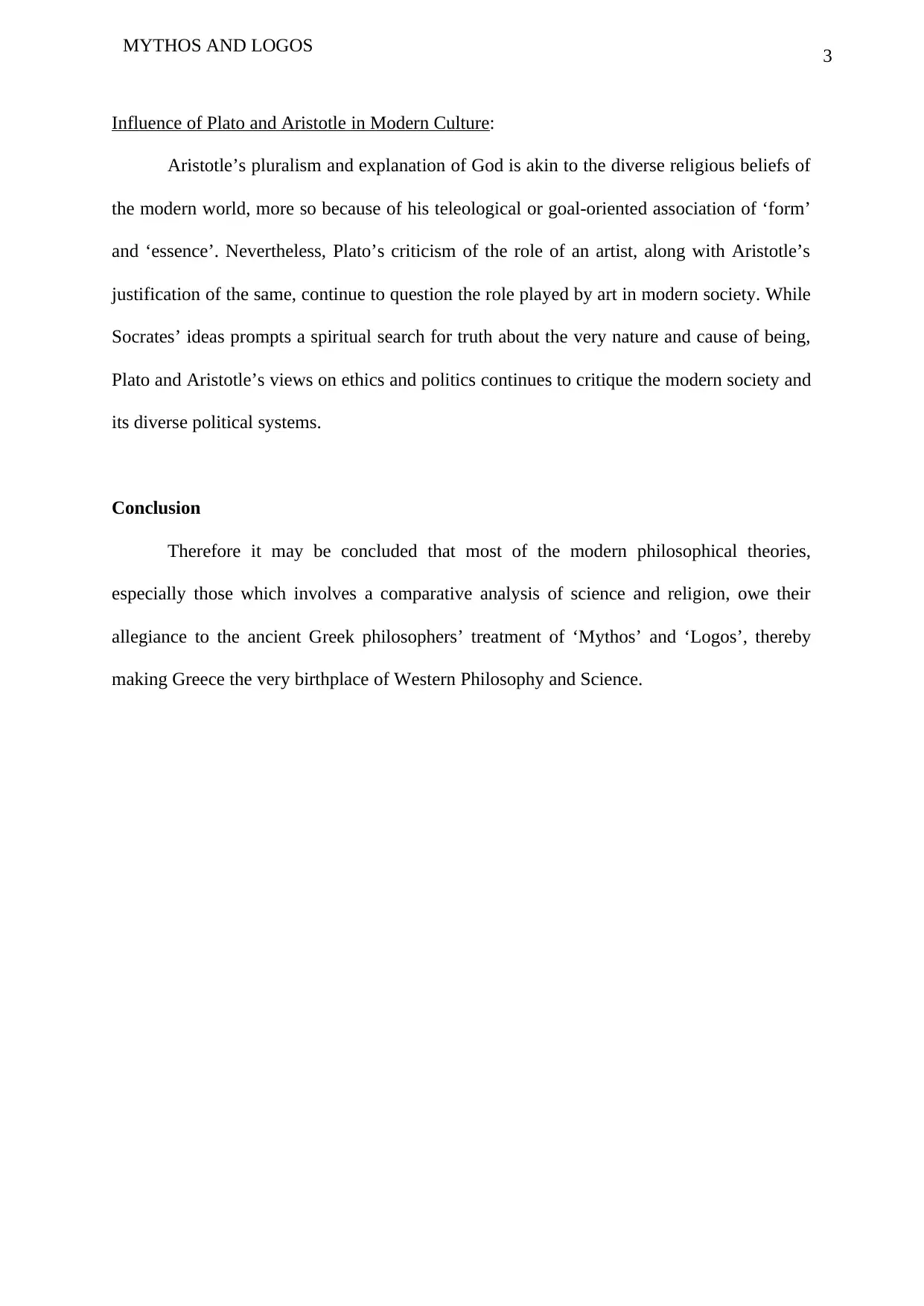
3
MYTHOS AND LOGOS
Influence of Plato and Aristotle in Modern Culture:
Aristotle’s pluralism and explanation of God is akin to the diverse religious beliefs of
the modern world, more so because of his teleological or goal-oriented association of ‘form’
and ‘essence’. Nevertheless, Plato’s criticism of the role of an artist, along with Aristotle’s
justification of the same, continue to question the role played by art in modern society. While
Socrates’ ideas prompts a spiritual search for truth about the very nature and cause of being,
Plato and Aristotle’s views on ethics and politics continues to critique the modern society and
its diverse political systems.
Conclusion
Therefore it may be concluded that most of the modern philosophical theories,
especially those which involves a comparative analysis of science and religion, owe their
allegiance to the ancient Greek philosophers’ treatment of ‘Mythos’ and ‘Logos’, thereby
making Greece the very birthplace of Western Philosophy and Science.
MYTHOS AND LOGOS
Influence of Plato and Aristotle in Modern Culture:
Aristotle’s pluralism and explanation of God is akin to the diverse religious beliefs of
the modern world, more so because of his teleological or goal-oriented association of ‘form’
and ‘essence’. Nevertheless, Plato’s criticism of the role of an artist, along with Aristotle’s
justification of the same, continue to question the role played by art in modern society. While
Socrates’ ideas prompts a spiritual search for truth about the very nature and cause of being,
Plato and Aristotle’s views on ethics and politics continues to critique the modern society and
its diverse political systems.
Conclusion
Therefore it may be concluded that most of the modern philosophical theories,
especially those which involves a comparative analysis of science and religion, owe their
allegiance to the ancient Greek philosophers’ treatment of ‘Mythos’ and ‘Logos’, thereby
making Greece the very birthplace of Western Philosophy and Science.
Paraphrase This Document
Need a fresh take? Get an instant paraphrase of this document with our AI Paraphraser
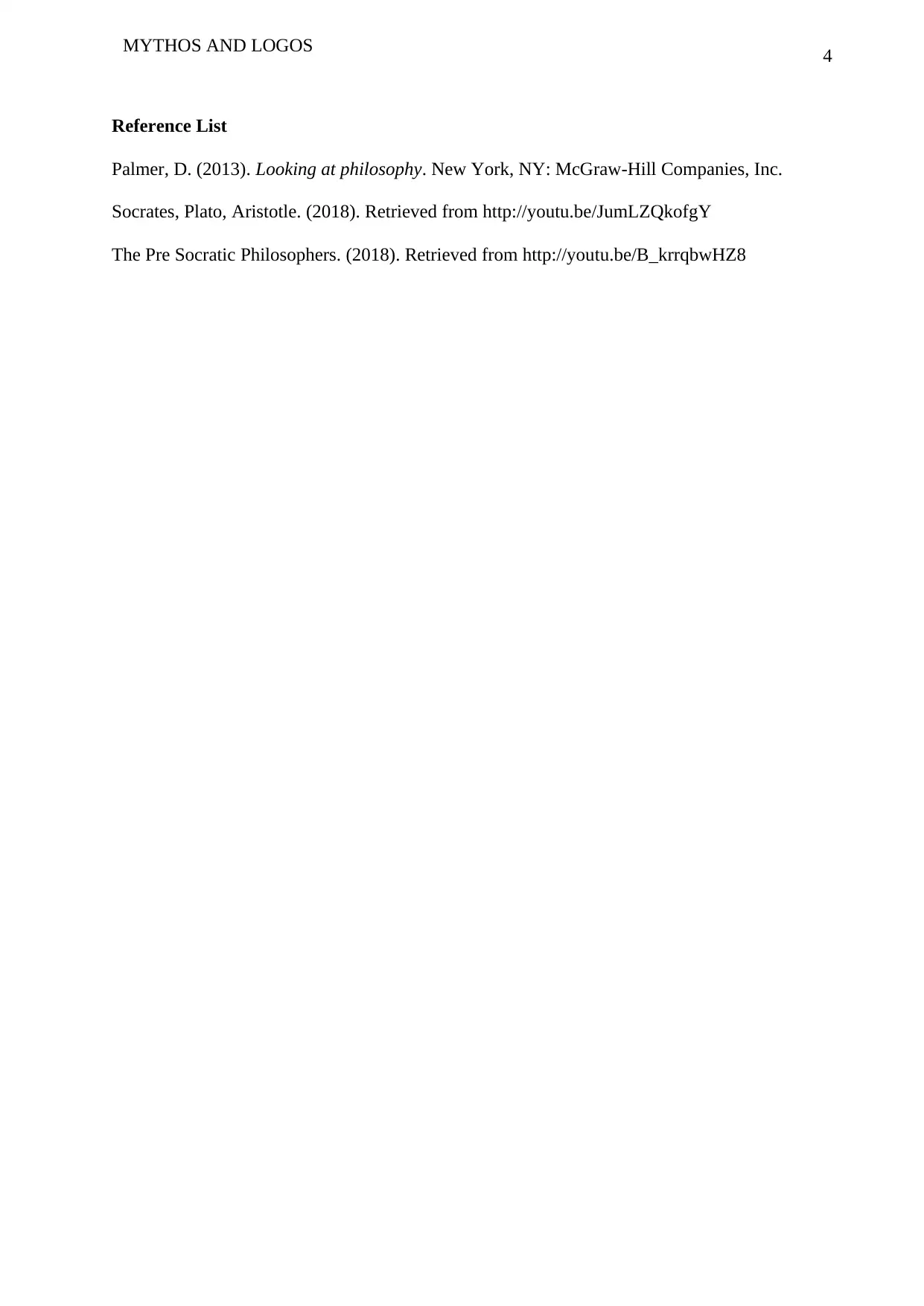
4
MYTHOS AND LOGOS
Reference List
Palmer, D. (2013). Looking at philosophy. New York, NY: McGraw-Hill Companies, Inc.
Socrates, Plato, Aristotle. (2018). Retrieved from http://youtu.be/JumLZQkofgY
The Pre Socratic Philosophers. (2018). Retrieved from http://youtu.be/B_krrqbwHZ8
MYTHOS AND LOGOS
Reference List
Palmer, D. (2013). Looking at philosophy. New York, NY: McGraw-Hill Companies, Inc.
Socrates, Plato, Aristotle. (2018). Retrieved from http://youtu.be/JumLZQkofgY
The Pre Socratic Philosophers. (2018). Retrieved from http://youtu.be/B_krrqbwHZ8
1 out of 5
Your All-in-One AI-Powered Toolkit for Academic Success.
+13062052269
info@desklib.com
Available 24*7 on WhatsApp / Email
![[object Object]](/_next/static/media/star-bottom.7253800d.svg)
Unlock your academic potential
Copyright © 2020–2026 A2Z Services. All Rights Reserved. Developed and managed by ZUCOL.
